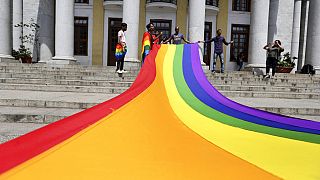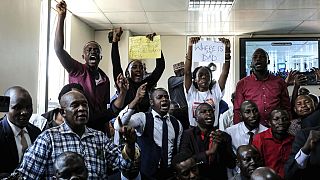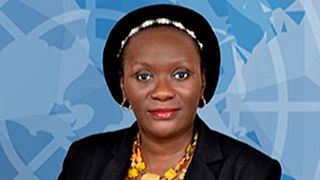Uganda
Uganda’s new anti-gay legislation is persecuting the LGBTQI community according to human rights lawyers.
Since the new law was enacted in May, they say they’ve become a target for violence and left homeless because landlords are too afraid to allow them to rent.
Behind a gate, in a private location, people belonging to the Ugandan LGBTQI+ community continually live in fear.
But at least they have found some security in a country where they believe their sexual orientation mean they cannot live normally.
In May the Ugandan government introduced a widely condemned act which prescribes the death penalty for some homosexual acts.
Organisations including the World Bank have warned they might withdraw resources from the country as a result.
Many LGBTQI Ugandans are seeking refuge in neighbouring countries like Kenya or seek to emigrate in western countries fearing imprisonment and reprisals.
For those who have remained and have little or nowhere to hide.
With a pride flag on his back, this man is an activist and member of the LGBTQI community who has organised a safe house to shelter people who are homeless because the law penalizes landlords for housing LGBTQI people.
His name has been withheld by the Associated Press.
He says: "Insecurity has been happening to us alright, like two weeks back some two men fall into this fence and they killed more than 16 hens in our farm, good enough we have dogs they didn’t went the way they came our dogs fought with them, so insecurities are too much not only to us."
He told the AP that 45 LGBTQI people have been living here since the law was passed.
"As per now most of the LGBTQI people have been evacuated from their places of stay reason being if they find out that you have been in that house and you are gay, another thing they do is now starting attacking you. This law as now brought, not only to LGBTQI persons but Ugandans as all not to be safe, reason being right now Landlords are not safe because they may not know what may happen to them if they are hosting LGBTQI persons," he says.
Cases of harassment and other abuses
The Ugandan president Yoweri Museveni argues the Anti Homosexuality Act doesn’t persecute gay groups in Uganda and that they are living freely.
Nicholas Opio is the Executive Director of Chapter Four, an organisation that has been at the forefront of fighting for the rights of the sexual minority Ugandans and other human rights abuses.
He says the organisation is continually receiving cases of harassment and other abuses from LGBTQI people across the country.
Opio says the president is playing to the gallery to try and appease political donors.
"Having come under extreme backlash, what President Museveni and his government is doing is managing public fallout and by assuaging donor concerns seeking to paint a picture that all is well nobody's being targeted. The people that we speak to everyday have a different reality. They are being targeted, people are being victimized for their sexuality, organizations are being threatened with closure. So President Museveni and government officials are involving double speak," says Opio.
Now he and other Ugandan groups are going to court to ensure that the Anti Homosexuality law is repealed.
According to Opio the necessary paperwork has been filed and they’re awaiting a decision.
He says: "We are at this point precisely because the courts ducked away from its responsibility and deciding the substantive questions of the fundamental rights and freedom of sexual minorities in Uganda. This time around the court has no excuse because there is no procedural technical arguments, the court must confront the elephant in the room whether the Ugandan constitution protects every single Ugandan including sexual minorities."
He argues it is time of the country’s legal system to take responsibility.
"The court must make a decision one way or the other. We are hopeful that the court will agree with us that this law is one, vague, overly broad and leads to a violation or possible violations of fundamental rights and freedoms of sexual minorities and a host of rights: privacy, health, access to employment and all kinds of rights. Secondly, we hope that the courts will make a finding that the legislative role of parliament really is to protect and not exclude members of our community,” says Opio.
'A bad law'
Opio says the new law is a violation of human rights because it prohibits the protection of all Ugandan citizens.
"Even our going to court to challenge the law could be interpreted as promoting homosexuality. Precisely because of that absurdity, is the reason we are saying the law is a bad law,” says Opio.
While the legal battle continues residents of the safe house are concerned that a ruling will come too late to save the only place where they feel at ease.
The anti-gay legislation, which prescribes the death penalty for some homosexual acts, sets lengthy jail terms for offenses such as the promotion of homosexuality.
Rights activists and others have described the legislation as harsh, saying it reflects widespread homophobia in the country.
The U.N. Human Rights Office has said the Ugandan law is "draconian and discriminatory," describing it as "a recipe for systematic violations of the rights" of LGBTQ+ people and others.
Activists and some academics have challenged the law in court, but it remains unclear when hearings will begin.
Homosexuality is criminalized in more than 30 of Africa’s 54 countries.











Go to video
Oligui Nguema: A breakthrough or continuity for Gabon? [Business Africa]
Go to video
HIV clinic for Johannesburg's gay community closes after aid freeze
02:42
Global healthcare at a crossroads: African scientists seek local solutions
04:40
Young child becomes second person to die of Ebola in Uganda
Go to video
Pics of the day: February 20, 2025
06:06
Frail Ugandan opposition figure back in jail after brief court appearance